
A Hollywood, CA-based plastic surgery clinic has been the victim of a ransomware attack, and the threat actor has published naked photos of patients online.
The clinic, which is owned by Dr. Gary Motykie, was contacted by a threat actor on May 9, 2023, who claimed to have access to the clinic's computer systems and sensitive patient data. The threat actor demanded a ransom of $2.5 million, but Dr. Motykie refused to pay.
On June 6, 2023, the threat actor published a sample of the stolen data online, including topless images of patients along with personal information such as names, birthdates, email addresses, phone numbers, and financial information. The threat actor also threatened to publish more data if Dr. Motykie did not pay the ransom.
Dr. Motykie has since notified patients about the data breach and has offered them free credit monitoring services. He has also said that he is working with law enforcement to investigate the attack.
The publication of the naked patient photos is a serious violation of privacy, and it has caused significant distress to the affected patients. It is also a reminder of the importance of cybersecurity for healthcare organizations.
Impact of the Data Breach
The data breach has had a significant impact on the affected patients. Many of them have reported feeling violated, embarrassed, and anxious. Some have even said that they are considering seeking counseling.
The data breach has also had a financial impact on the patients. Some of them have had to pay for credit monitoring services, and others have had to deal with identity theft.
In addition to the emotional and financial impact, the data breach has also had a negative impact on the clinic's reputation. Some patients have said that they will no longer use the clinic's services, and others have said that they are considering filing a lawsuit against the clinic.
Recommendations
The following are some recommendations for healthcare organizations to help prevent data breaches:
Implement strong cybersecurity measures, such as firewalls, antivirus software, and data encryption.
Train employees on cybersecurity best practices.
Conduct regular security assessments.
Have a plan in place to respond to a data breach.
Healthcare organizations should also be aware of the risks associated with ransomware attacks. Ransomware is a type of malware that encrypts a victim's files and demands a ransom payment in order to decrypt them. Ransomware attacks are becoming increasingly common, and they can have a devastating impact on businesses.
Conclusion
The publication of naked patient photos after a ransomware attack is a serious violation of privacy. Healthcare organizations should take steps to prevent data breaches and to respond to them effectively if they occur.
In addition to the recommendations listed above, healthcare organizations should also consider the following:
Use multi-factor authentication (MFA) to protect user accounts.
Educate employees about phishing scams and other social engineering tactics.
Keep software up to date with the latest security patches.
Back up data regularly in case of a breach.
By taking these steps, healthcare organizations can help to protect patient privacy and reduce the risk of a ransomware attack.

